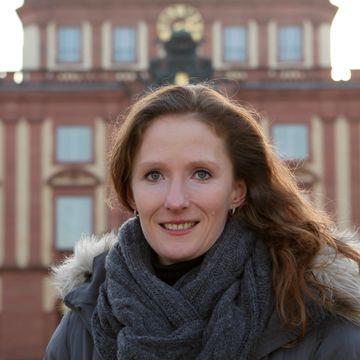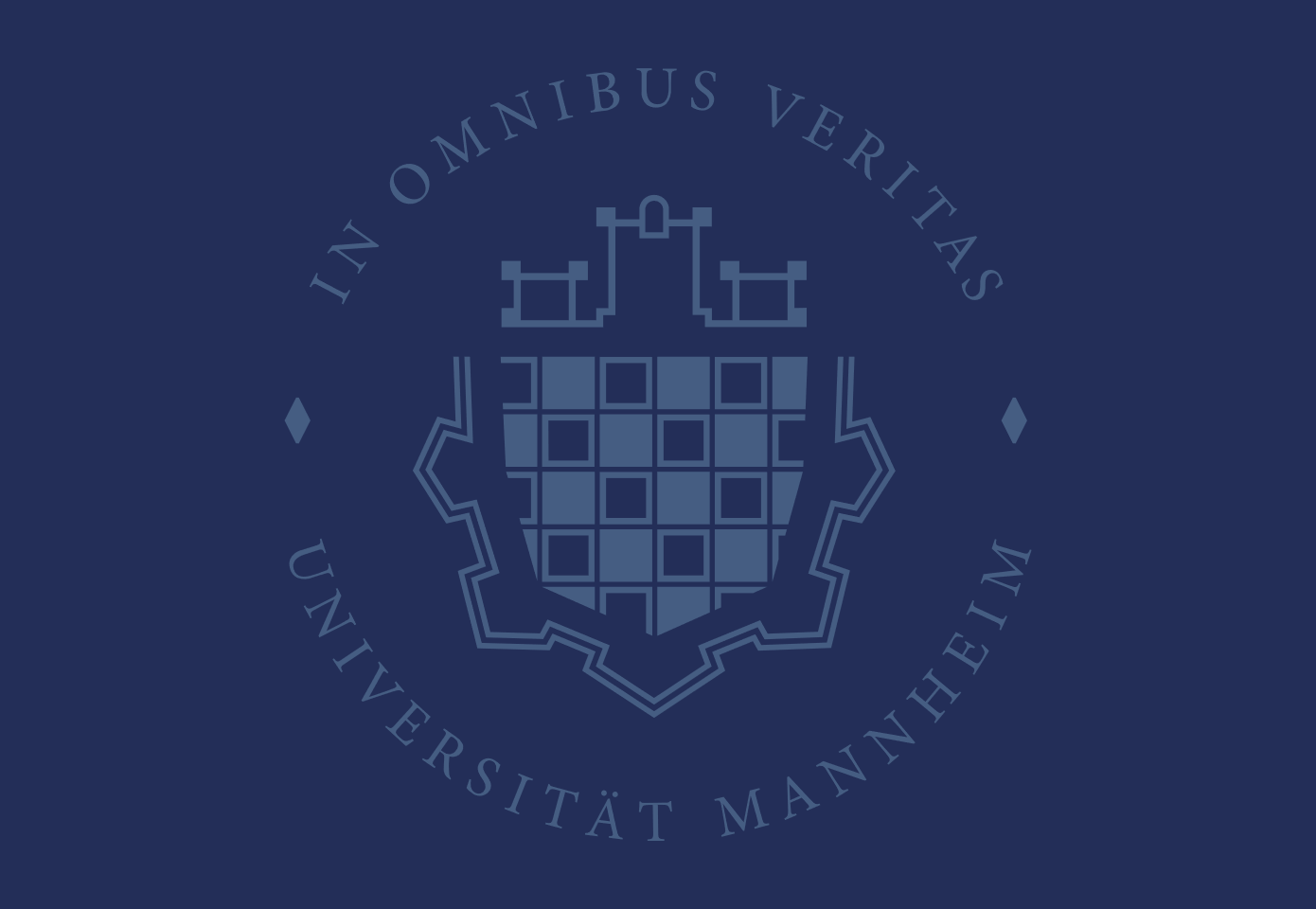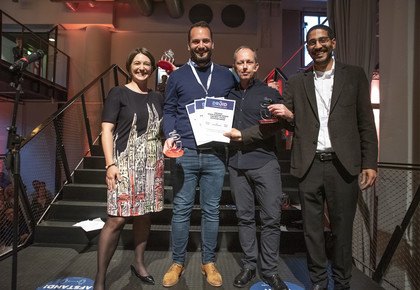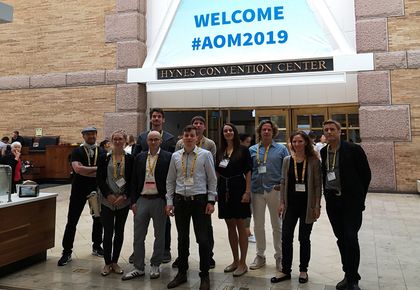Area Management
Die Area Management ist Teil der Fakultät für Betriebswirtschaftslehre und besteht aus den Lehrstühlen der Professoren Torsten Biemann, Matthias Brauer, Bernd Helmig, Karin Hoisl und Michael Woywode sowie aus Dr. Maren Rottler, Dr. Marc Lerchenmüller, Dr. Jan-Philipp Ahrens, Dr. Dominika Wruk und Dr. Jan Zybura.
Auf dieser Seite finden Sie Informationen zu den Professoren der Area, den wissenschaftlichen Mitarbeitern sowie einen Einblick in die Forschungsprojekte der Area Management. Außerdem gibt Ihnen die Seite einen Überblick über das vielfältige Lehrangebot, Publikationen und beinhaltet interessante Angebote für Studium, Forschung und Karriere.
In der aktuellen Ausgabe der Area Management News berichten die sechs Lehrstühle der Area Management über das Jahr 2023.
Schauen Sie rein!
Lehrstühle und ProfessorInnen
Publikationen
- Adomako, S., Zhu, F., Hsu, D. K., Istipliler, B. und Wiklund, J. (2024). Navigating environmental threats to new ventures: A regulatory fit approach to bricolage. Journal of Management Studies : JMS, 1–45.
- Brauer, M. und Binder, P. D. (2024). The effectiveness of verbal mimicry in activist hedge fund campaigns. Journal of Management : JOM, 1–32.
- Castellanza, L. und Woywode, M. (2024). Types, determinants, and outcomes of entrepreneurial behaviours during crises. Entrepreneurship and Regional Development, 1–30.
- Dahlke, J., Beck, M., Kinne, J., Lenz, D., Dehghan, R., Wörter, M. und Ebersberger, B. (2024). Epidemic effects in the diffusion of emerging digital technologies: evidence from artificial intelligence adoption. Research Policy, 53, 1–24.
- Dlouhy, K. und Froidevaux, A. (2024). Evolution of professionals' careers upon graduation in STEM and occupational turnover over time: Patterns, diversity characteristics, career success, and self-employment. Journal of Organizational Behavior : OB, 45, 344–361.
- Dlouhy, K., Schmitt, A. und Kandel, I. J. (2024). A job demands–resources perspective on emotional exhaustion and work engagement in human–animal work. Occupational Health Science, 1–29.
- Englert, B., Sievert, M., Helmig, B. und Jansen, K. (2024). The incongruity of misfit: A systematic literature review and research agenda. Human Relations, 77, 1306-1332.
- Henninger, M., Rottler, M. und Helmig, B. (2024). Under pressure: Social information on reference groups and its influence on volunteering intention—a survey experiment. Nonprofit and Voluntary Sector Quarterly, 53, 510–535.
- Koch-Bayram, I. und Biemann, T. (2024). How corporate social (ir)responsibility influences employees’ private prosocial behavior: An experimental study. Journal of Business Ethics, 194, 103–118.
- Koch-Bayram, I. und Kaibel, C. (2024). Algorithms in personnel selection, applicants' attributions about organizations' intents and organizational attractiveness: An experimental study. Human Resource Management Journal, 34, 733–752.
- Kroll, C. M. und Edinger-Schons, L. M. (2024). Corporate power and democracy: A business ethical reflection and research agenda. Business Ethics, the Environment & Responsibility, 33, 349–362.
- Mayrhofer, W., Biemann, T., Koch-Bayram, I. und Rapp, M. L. (2024). Context is key: A 34-country analysis investigating how similar HRM systems emerge from similar contexts. Human Resource Management, 63, 355–371.
- Mula, C., Zybura, N. und Hipp, T. (2024). From digitalized start-up to scale-up: Opening the black box of scaling in digitalized firms towards a scaling process framework. Technological forecasting & social change, 202, 1–16.
- Pinz, A., Englert, B. und Helmig, B. (2024). Organizing logic multiplicity in hybrid organizations: The role of organizational culture. Nonprofit Management & Leadership, 1–26.
- Román Almánzar, A. D., Grüning, D. J. und Edinger-Schons, L. M. (2024). ‘It wasn’t me’: the impact of social responsibility and social dominance attitudes on AI programmers’ moral imagination (intention to correct bias). AI and Ethics, 1–15.
- Schmallenbach, L., Bärnighausen, T. W. und Lerchenmueller, M. J. (2024). The global geography of artificial intelligence in life science research. Nature Communications, 15, 1–12.
- Sievert, M. und Bruder, J. (2024). Unpacking the effects of burdensome state actions on citizens' policy perceptions. Public Administration, 102, 915–935.
- Suwala, L., Ahrens, J.-P. und Basco, R. (2024). Family firms, hidden champions and regional development. ZFW – Advances in Economic Geography, 68, 1–8.
- Zybura, J., Ahrens, J.-P., Istipliler, B., Woywode, M. und Kowalzick, M. (2024). It takes two to Tango – Conceptualizing the “succession dance” in family firms through social exchange theory. Journal of General Management.
- Appels, M. (2023). CEO sociopolitical activism as a signal of authentic leadership to prospective employees. Journal of Management : JOM, 49, 2727-2765.
- Bhattacharya, C. B., Sen, S., Edinger-Schons, L. M. und Neureiter, M. (2023). Corporate purpose and employee sustainability behaviors. Journal of Business Ethics, 183, 963–981.
- Biemann, T., Mayrhofer, W. und Koch-Bayram, I. (2023). Embedded in context: How time and distance affect the convergence of personnel selection practices. Human Resource Management Journal, 33, 47–68.
- Bort, S. und Kieser, A. (2023). Coping with devils and climate change with the help of asceticism? Exploring the role of asceticism as trigger of collective climate action. Environmental Values : EV, 1–30.
- Brauer, M. und Vandepoele, L. (2023). Managing the “downside” of downsizing: Firms' impression offsetting around downsizing announcements. Journal of Management Studies : JMS, 1–33.
- Brauer, M., Wiersema, M. und Binder, P. D. (2023). „Dear CEO and board“: how activist investors' confidence in tone influences campaign success. Organization Science, 34, 1487-1508.
- Colombo, M. G., Guerini, M., Hoisl, K. und Zeiner, N. (2023). The dark side of signals: patents protecting radical inventions and venture capital investments. Research Policy, 52.
- Hoisl, K., Kongsted, H. C. und Mariani, M. (2023). Lost Marie Curies: Parental impact on the probability of becoming an inventor. Management Science, 69, 1714-1738.
- Isaak, R. (2023). Entrepreneurship in international context: Trends and coping with eco-entropy. Circular Economy, 1, 1–5.
- Istipliler, B., Ahrens, J.-P., Bort, S. und Isaak, A. (2023). Is exposure to the family firm always good for the next CEO? How successor pre-succession firm experience affects post-succession performance in family firms. Journal of Business Research : JBR, 167, 1–15.
- Istipliler, B., Ahrens, J.-P., Hauer, A., Steininger, D. M. und Woywode, M. (2023). Heroes of the Green Room – How Able Successors Revitalize and Reinvent Family Firms. Journal of Small Business Management.
- Istipliler, B., Bort, S. und Woywode, M. (2023). Flowers of adversity: Institutional constraints and innovative SMEs in transition economies. Journal of Business Research : JBR, 154.
- Istipliler, B., Hauer, A., Keese, D., Woywode, M. und Ahrens, J.-P. (2023). Childhood exposure to family firm and transgenerational orientation: Moderated mediation of affective commitment. Journal of Small Business Management, 1–44.
- Koch-Bayram, I., Kaibel, C., Biemann, T. und Triana, M. . C. (2023). : Applicants' experiences with discrimination explain their reactions to algorithms in personnel selection. International Journal of Selection and Assessment : IJSA, 31, 252–266.
- Kowalzick, M., Ahrens, J.-P., Lauterbach, J. G. und Tang, Y. (2023). Overconfident CEOs in dire straits: How incumbent and successor CEOs’ overconfidence affects firm turnaround performance. Journal of Management Studies : JMS, 1–48.
- Kowalzick, M. und Appels, M. (2023). To change or not to change? Evidence on the steadiness of more hubristic CEOs. Journal of Management : JOM, 49, 2415-2454.
- Lanivich, S., Adomako, S., Ahsan, M., Istipliler, B. und Cox, K. C. (2023). Multidimensional cognitive style: Linking founders to firm performance through strategy and resource orchestration. Journal of Business Research : JBR, 166.
- Lerchenmueller, M. J., Schmallenbach, L., Bley, M. und Lerchenmüller, C. (2023). Gender disparities in altmetric attention scores for cardiovascular research. Communications biology, 6, 1–5.
- Lin-Hi, N., Gao-Urhahn, X., Biemann, T. und Koch-Bayram, I. (2023). Internal CSR and blue‑collar workers’ attitudes and behaviors in China: a combination of a cross‑sectional study and a field experiment. Asian Business & Management, 22, 1185-1213.
- Meier-Barthold, M., Biemann, T. und Alfes, K. (2023). Strong signals in HR management: How the configuration and strength of an HR system explain the variability in HR attributions. Human Resource Management, 62, 229–246.
- Sievert, M. (2023). The limited impact of reference groups' symbolic gender representation on willingness to coproduce. Public Administration Review : PAR, 83, 587–602.
- Wieschollek, V. und Dlouhy, K. (2023). Employee referrals as counterproductive work behavior? Employees’ motives for poor referrals and the role of the cultural context. International Journal of Human Resource Management, 34, 2708-2731.
- Becker, S., Bergenholtz, C., Bogers, M., Brasseur, T.-M., Conradsen, M. L., Di Marco, D., Distel, A. P., Dobusch, L., Dörler, D., Effert, A., Fecher, B., Filiou, D., Frederiksen, L., Gillier, T., Grimpe, C., Gruber, M., Häussler, C., Heigl, F., Hoisl, K., Hyslop, K., Kokshagina, O., LaFlamme, M., Lawson, C., Lifshitz-Assaf, H., Lukas, W., Nordberg, M., Norn, M. T., Poetz, M., Ponti, M., Pruschak, G., Pujol Priego, L., Radziwon, A., Rafner, J., Romanova, G., Ruser, A., Sauermann, H., Shah, S. K., Sherson, J. F., Suess-Reyes, J., Tucci, C. L., Türtscher, P., Vedel, J. B., Velden, T., Verganti, R., Wareham, J., Wiggins, A. und Xu, S. M. (2022). The Open Innovation in science research field: a collaborative conceptualisation approach. Industry and Innovation, 29, 136–185.
- Castellanza, L. (2022). Discipline, abjection, and poverty alleviation through entrepreneurship: A constitutive perspective. Journal of Business Venturing, 37, 1–18.
- Gottschalk, S. und Müller, B. (2022). A second chance for failed entrepreneurs: a good idea? Small Business Economics, 59, 745–767.
- Herzum, J., Sievert, M. und Helmig, B. (2022). Effects of corporate environmental activities on evaluators' propriety beliefs. Academy of Management Proceedings, 2022.
- Keppeler, F., Sievert, M. und Jilke, S. (2022). Increasing COVID-19 vaccination intentions: a field experiment on psychological ownership. Behavioural Public Policy : BPP, 1–20.
- Sievert, M., Vogel, D. und Feeney, M. K. (2022). Formalization and administrative burden as obstacles to employee recruitment: Consequences for the public sector. Review of Public Personnel Administration, 42, 3–30.
- Sipilä, J., Alavi, S., Edinger-Schons, L. M., Müller, U. und Habel, J. (2022). Corporate social responsibility and perceived fairness of price increases. Psychology & Marketing, 39, 1370-1384.
- Waerder, R., Thimmel, S., Englert, B. und Helmig, B. (2022). The Role of nonprofit–private collaboration for nonprofits’ organizational resilience. Voluntas : International Journal of Voluntary and Nonprofit Organizations, 33, 672–684.
- Biemann, T. und Weckmüller, H. (2021). Psychologische Sicherheit: Erfolgsfaktor für Teamerfolg jenseits der Teamzusammensetzung. Personal Quarterly, 73, 46–49.
- Biemann, T. und Weckmüller, H. (2021). Wie ein effektives Performance Management zum Organisationserfolg beitragen kann. Personal Quarterly, 73, 46–49.
- Gerberich, C. W. und Woywode, M. (2021). Digitalisierungskompetenz in mittelständischen Unternehmen. Der Aufsichtsrat, 18, 127–129.
- Helmig, B., Jegers, M., Lapsley, I. und Pettersen, I. J. (2021). Guest editorial: Third Sector challenges in the contemporary world. Journal of Accounting & Organizational Change : JAOC, 17, 1–4.
- Herden, C. J., Alliu, E., Cakici, A., Cormier, T., Deguelle, C., Gambhir, S., Griffiths, C., Gupta, S., Kamani, S. R., Kiratli, Y.-S., Kispataki, M., Lange, G., Moles de Matos, L., Tripero Moreno, L., Betancourt Nuñez, H. A., Pilla, V., Raj, B., Roe, J., Skoda, M., Song, Y., Ummadi, P. K. und Edinger-Schons, L. M. (2021). “Corporate Digital Responsibility” : New corporate responsibilities in the digital age. Sustainability Management Forum = NachhaltigkeitsManagementForum : SMF, 29, 13–29.
- Kaibel, C. und Biemann, T. (2021). Rethinking the gold standard with multi-armed bandits: Machine learning allocation algorithms for experiments. Organizational Research Methods : ORM, 24, 78–103.
- Leicht, R. und Philipp, R. (2021). Lage und Entwicklung der mittelständischen Wirtschaft in Baden-Württemberg. Mittelstandsbericht des Landes Baden-Württemberg, 2021, 19–30.
- Oberg, A., Lefsrud, L. und Meyer, R. E. (2021). Organizational (issue) field perspective on climate change. Economic Sociology. Perspectives and Conversations, 22, 21–29.
- Sievert, M. (2021). A replication of „Representative bureaucracy and the willingness to coproduce“. Public Administration, 99, 616–632.
- Sipilä, J., Alavi, S., Edinger-Schons, L. M., Dörfer, S. und Schmitz, C. (2021). Corporate social responsibility in luxury contexts: potential pitfalls and how to overcome them. Journal of the Academy of Marketing Science, 49, 280–303.
- Tonoyan, V. und Strohmeyer, R. (2021). Gender role (in-)congruity and resource-provider gender biases: a conceptual model. International Journal of Gender and Entrepreneurship, 13, 225–242.
- Wieschollek, V., Weckmüller, H. und Biemann, T. (2021). Mitarbeiterempfehlungen und Mitarbeiterempfehlungsprogramme. Personal Quarterly, 73, 58–61.
- Zybura, J., Zybura, N., Ahrens, J.-P. und Woywode, M. (2021). Innovation in the post-succession phase of family firms: Family CEO successors and leadership constellations as resources. Journal of Family Business Strategy, 12.
- Felfe, C., Kagerbauer, L., Müller, M., Sajons, C., Saurer, J. und Zwick, T. (2022). Mehr Ausbildung wagen!: Barrieren und Chancen für die Einstellung von Geflüchteten in deutschen Unternehmen. Policy brief, 1. Mannheim: Institut für Mittelstandsforschung der Universität Mannheim.
- Sajons, C., Philipp, R. und Hartmann, C. (2022). Selbständigkeit von Geflüchteten und Zugewanderten – Alternativer Weg in den Arbeitsmarkt oder berufliche Sackgasse? Policy brief, 2. Mannheim: Institut für Mittelstandsforschung der Universität Mannheim.
- Wruk, D. und Oberg, A. (2022). Wirkungen der Sharing Economy in Deutschland. i-share Report, 3. Mannheim.
- Mair, J., Veit, D. J. und Woywode, M. (2021). Arbeiten in der Sharing Economy in Deutschland. i-share Report, 2. Mannheim.
- Wecker, B. und Brauer, M. (2023). Misbehave like nobody’s watching? Investor attention to corporate misconduct and its implications. In , (S. ). Academy of Management Proceedings, Academy of Management: Briarcliff Manor, NY.
- Ahrens, J.-P., Isaak, A., Istipliler, B., Rottler, M. und Steininger, D. M. (2021). Ultimate dream management: An innovative crowdfunding management technique for the creation of desired products. In , Reshaping capitalism for a sustainable world : EURAM 2021, online conference, 16–18 June 2021; programme book (S. 188). , EURAM: Brussels.
- Krlev, G., Wruk, D., Pasi, G. und Bernhard, M. (Hrsg.) (2023). Social economy science : transforming the economy and making society more resilient. Oxford: Oxford University Press.
- Helmig, B., Dorf, Y. und Kliment, C. (Hrsg.) (2022). Hochschul-Fundraising. Bonn: Deutscher Hochschulverband.
- Ahrens, J. (2024). Performance : performance theory and performance concepts between achievement, profit, and sustainability. In Elgar encyclopedia of family business (S. 330–334). Cheltenham: Edward Elgar Publishing.
- Ahrens, J.-P., Onneken, F., Rottler, M., Strohmeyer, R. und Torchia, M. (2024). Gender equality in firm leadership worldwide: Where are we now and how do family and non-family firms differ? In Women in family business : New perspectives, contexts and roles (S. 21–62). Cheltenham: Edward Elgar Publishing.
- Tänzler, J. K. und Hauer, A. (2024). The past catches up with everyone: legal failures of the previous generation threaten a family firm’s future. In Case Studies in Family Business Overcoming Destructive Conflict, Deviance, and Dysfunction in the Family Firm (S. 138–146). Cheltenham [u.a.]: Edward Elgar Publishing.
- Ahrens, J.-P. und Hauer, A. (2023). Die 500 größten Familienunternehmen in Deutschland. In Die volkswirtschaftliche Bedeutung der Familienunternehmen (S. 37–70). München: Stiftung Familienunternehmen.
- Krlev, G., Wruk, D., Pasi, G. und Bernhard, M. (2023). Social economy: Between common identity and accelerating social change. In Social economy science : transforming the economy and making society more resilient (S. 37–68). Oxford: Oxford University Press.
- Wecker, B. und Brauer, M. (2023). „Crowd contamination“? Spillover effects in the context of misconduct allegations. In Organizational wrongdoing as the „foundational“ grand challenge : consequences and impact (S. 53–72). Bingley [u.a.]: Emerald.
- Helmig, B. und Rottler, M. (2022). Fundraising und Hochschul-Fundraising – Grundlagen, Literaturüberblick und Erfolgsfaktoren. In Hochschul-Fundraising (S. 41–47). Bonn: Deutscher Hochschulverband.
- Hipp, T., Mula, C. und Zybura, N. (2022). Perspectives on startup-corporate partnerships' value creation: An overview on different types of partnerships and practices. In Corporate-Start-up-Partnerschaften (S. 135–145). Berlin: Springer Gabler.
- Hoisl, K., Lerchenmüller, C., Lerchenmueller, M. J. und Schmallenbach, L. (2022). The power of attention: Early indications of how the COVID-19 pandemic has affected the direction of scientific research in the life sciences. In Resilience and ingenuity : global innovation responses to Covid-19 (S. 163–173). London: CEPR Press.
- Oberg, A., Powell, W. W. und Schöllhorn, T. (2022). Representations of self in the digital public sphere: The field of social impact analyzed through relational and discursive moves. In Digital transformation and institutional theory (S. 167–196). Bingley: Emerald.
- Ballarini, K., Keese, D. und Hauer, A. (2021). Unternehmensnachfolge. In Betriebswirtschaftslehre der Mittel- und Kleinbetriebe : größenspezifische Probleme und Möglichkeiten zu ihrer Lösung (S. 455–483). Berlin: Erich Schmidt Verlag.
- Helmig, B., Friedrich-Schieback, M. und Thimmel, S. (2021). Quantitative Erhebung zum Thema Arbeiten in der Sharing Economy. In Arbeiten in der Sharing Economy (S. 36–45). Mannheim: .
- Helmig, B., Motyka, M. und Englert, B. (2021). Risk management in venture philanthropy partnerships. In Critical contributions to economics and beyond (S. 172–197). Berlin: Lexxion.
- Isaak, A., Bort, S. und Woywode, M. (2021). The geoeconomics of cryptocurrencies: an institutional perspective. In The economics of cryptocurrencies (S. 90–102). London ; Milton: Routledge, Taylor & Francis.
- Kehnel, A. und Edinger-Schons, L. M. (2021). Mit „WUM“ an die Spitze der Nachhaltigkeitsforschung. In Eine Universität für die Gesellschaft : 75 Jahre Neubegründung Wirtschaftshochschule und Universität Mannheim (S. 260–262). Ubstadt-Weiher: verlag regionalkultur.
- Strohmeyer, R. und Weiss, J. (2021). Between adaption and rejection: Intergenerational transmission of resources and work values in Germany. In Intergenerational transmission and economic self-sufficiency (S. 129–158). Cham: Springer International Publishing.
- Woywode, M. (2021). Ein Kompetenzzentrum für die mittelständische Wirtschaft: Das Institut für Mittelstandsforschung der Universität Mannheim. In Eine Universität für die Gesellschaft : 75 Jahre Neubegründung Wirtschaftshochschule und Universität Mannheim (S. 138–140). Ubstadt-Weiher: verlag regionalkultur.









